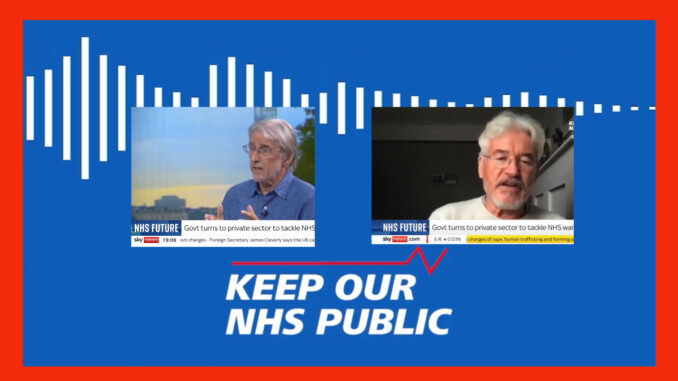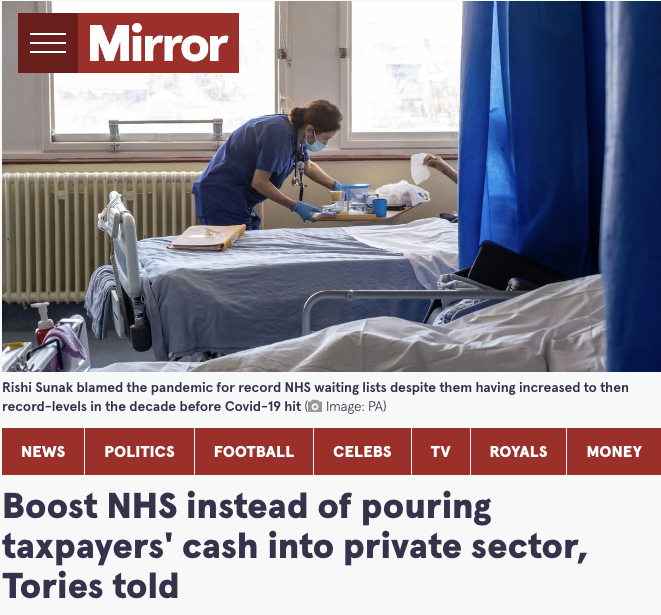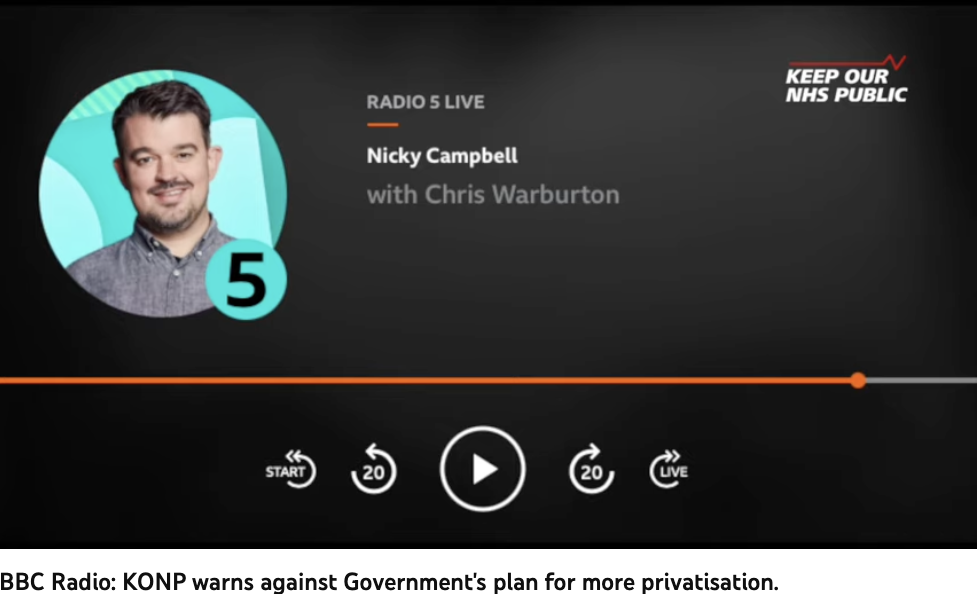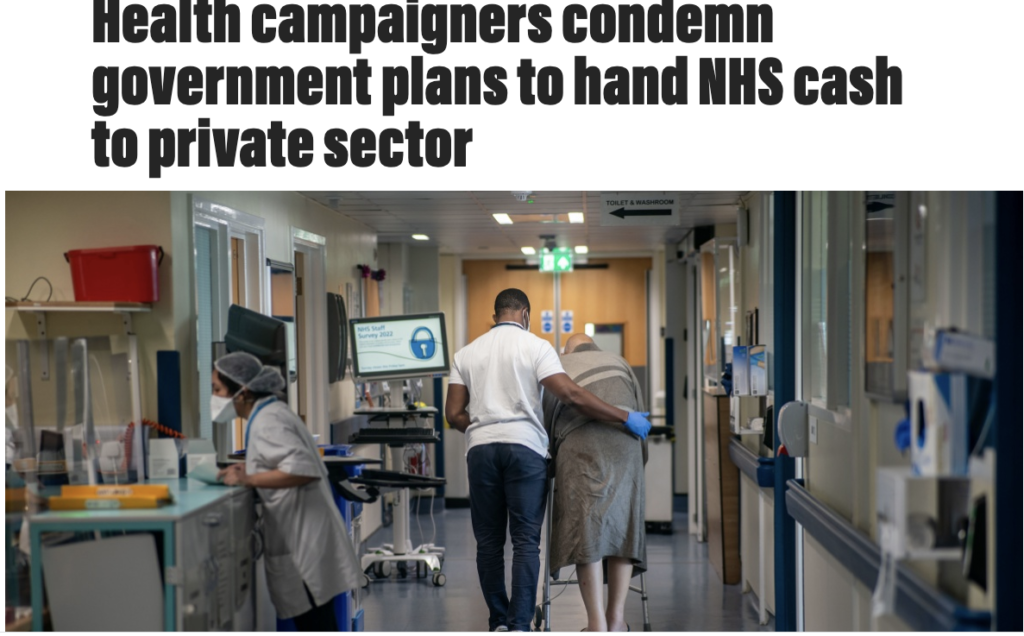

Report of our major contribution to media debate on Government private sector announcement
From Samantha Wathen, KONP Press and Media Officer
Private sector involvement in NHS treatment centres
On Friday 4th August, the government announced plans to rapidly accelerate private sector involvement in the NHS by introducing a total of 13 new diagnostic centres in an effort to bring down the now around 7.5 million high NHS waiting lists. Significantly, 8 of the 13 centres will be run by the private health sector, part of the government target of 160 centres across the country by 2025 many of them privately-run, backed by £2.3 billion from the Treasury, ready to invest in the private sector funding that would be far better spent in the NHS.
Keep Our NHS Public was at the forefront of this debate as it played out in the press and media, appearing in no less than 6 national news outlets, taking part in 7 appearances on this one subject in the space of around 24 hours. Quite rightly our organisation is seen as the go-to on this subject as a reliable and authoritative source of up-to-date comment on all the nuanced issues surrounding public vs private sector involvement in healthcare.
Daily Mirror
Co-chair of Keep Our NHS Public and retired consultant paediatrician, Dr Tony O’Sullivan said in The Daily Mirror:
“Investing yet more public money into the private sector is not the answer. Punishingly low pay in the NHS and care has pushed some struggling staff towards the private sector leaving the NHS diagnostics and clinical services desperately short. There is no spare capacity in the private sector that does not do further damage to the NHS, taking NHS staff away, diverting NHS funding, cherry picking non-complex care and using the NHS to send back complications from private treatment. It is NHS capacity that must urgently be rebuilt. The Government has clearly found additional funds for healthcare, but has chosen to spend it lining the pockets of shareholders instead of funding a public service, a choice that further erodes the capability of the NHS to deliver timely treatment for all.”

BBC Radio 5 Live
During the pandemic the government paid the private sector billions of pounds to support with routine work, but nearly half of their capacity was unused. The private sector depletes the NHS, as our other Co-chair (also a retired consultant paediatrician) Dr John Puntis, explained on BBC Radio 5 Live on Friday morning. Listen to his interview here.

Sky News Lunchtime
Dr Puntis also appeared on the primetime lunchtime Sky News slot via video call. In his interview he pointed out that less than ten years ago the NHS was independently ranked to be the best most cost-effective healthcare system in the world and that money should be invested into the NHS, rather than the private sector. He warned that:
“an ideological obsession with outsourcing and giving money to the private sector…you get a less good service and some of the money that could have gone into building the NHS is siphoned off to shareholders…the private sector is poorly regulated, and has a poor safety record.”
Watch the interview here.
Sky News Evening
At 7pm, Dr Tony O’Sullivan then appeared live in the studio on Sky News to debate with health journalist and former NHS Trust Chairman, Roy Lilley. Tony made the point that the expansion of the new private sector centres can only be staffed from the NHS, and as a result the NHS would be made even weaker. There is only one staff resource that must be shared and key diagnostic roles such as radiographers are already in short supply amongst the workforce.
Tony went on to describe how similar initiatives in the past (under Tony Blair) did not solve the crisis then either.
“It was not the independent treatment centres that solved the waiting list [crisis] it was actually the expansion of the NHS.”
Watch the full interview here:
The Morning Star
The Morning Star then took up the story, quoting Dr John Puntis who said:
“Chronic and severe underfunding” was the cause of the public service’s problems.
“Giving £19bn to the private health sector is about as intelligent as committing to net zero and then handing out over 100 new oil and gas licences. The private health sector is a profit maximiser and not a cost minimiser. It is parasitic upon the NHS and does not train its own staff but takes them from the NHS. There is therefore only one pool of staff and if more work is done in the private sector less is done in the NHS.”

LBC with Ben Kentish
The following morning (Saturday 5th August) Dr John Puntis was a guest on LBC with host, Ben Kentish.
Dr Puntis said:
“The idea that the private sector has this spare capacity, I’m doubtful about. I think that’s the kind of answer you come up with if you put together the kind of taskforce that Rishi Sunak did, and you fill it with people from the private sector.”
Ben admitted to being a pragmatic supporter of the government initiative to award the private sector this money to deliver work. However, Dr Puntis argued his point exceptionally well – listen here.
LBC with Nick Abbot
To round up our coverage on this subject, late on Saturday night Dr Tony O’Sullivan appeared on LBC with Nick Abbott. Dr O’Sullivan spoke at length about the history of the NHS under other governments and how, when well-funded, the NHS had always delivered the best most efficient service. He described how 6,500 patients a year were transferred back from the private sector to the NHS as a result of complications, thereby costing the NHS more. Tony and Nick spoke about how billions of pounds have been wasted in recent years by awarding contracts to the private sector instead of the NHS. Listen to the complete interview here.
Keep Our NHS Public continues to be a vital source of reliable up to the minute knowledge on the plight of the NHS, whilst also advocating for NHS staff and a better system for all – but we can’t do it alone. Please consider supporting us.
Samantha Wathen is the Press and Media Officer for Keep Our NHS Public

Leave a Reply